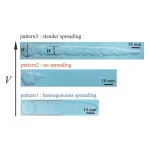(Press-News.org) Research Highlights:
A novel vaccine that targets a protein involved in Alzheimer’s disease helped eliminate toxic cells in mice with the condition.
After vaccination, the mice had fewer amyloid plaques and less inflammation in brain tissue and showed improvement in behavior and awareness.
Embargoed until 12 p.m. CT/1 p.m. ET, Sunday, July 30, 2023
BOSTON, July 30, 2023 — A novel vaccine that targets inflamed brain cells associated with Alzheimer’s disease may hold the key to potentially preventing or modifying the course of the disease, according to preliminary research presented at the American Heart Association’s Basic Cardiovascular Sciences Scientific Sessions 2023. The meeting is in Boston, July 31–Aug. 3, 2023, and offers the latest research on innovations and discovery in cardiovascular science.
Previously, researchers at Juntendo University Graduate School of Medicine in Tokyo, Japan developed a vaccine to eliminate senescent cells expressing senescence-associated glycoprotein (SAGP) - a senolytic vaccine that improved various age-related diseases including atherosclerosis and Type 2 diabetes in mice. Another study also found that SAGPs are highly expressed in glial cells in people with Alzheimer’s disease. Based on the findings from these studies, the researchers tested this vaccine in mice to target SAGP-overexpressed cells to treat Alzheimer’s disease.
“Alzheimer’s disease now accounts for 50% to 70% of dementia patients worldwide. Our study’s novel vaccine test in mice points to a potential way to prevent or modify the disease. The future challenge will be to achieve similar results in humans,” said lead study author Chieh-Lun Hsiao, Ph.D., a post-doctoral fellow in the department of cardiovascular biology and medicine at Juntendo University Graduate School of Medicine in Tokyo. “If the vaccine could prove to be successful in humans, it would be a big step forward towards delaying disease progression or even prevention of this disease.”
In this study, the research team created an Alzheimer’s disease mouse model that mimics a human brain and simulates amyloid-beta-induced Alzheimer’s disease pathology. To test the efficacy of the SAGP vaccine, the mice were treated with a control vaccine or the SAGP vaccine at two and four months old. Usually, people in the late stage of Alzheimer’s lack anxiety, which means they are not aware of the things around them. The mice who received the vaccine had anxiety, which means that they were more cautious and more aware of things around them – a sign researcher say could indicate a lessening of the disease. In addition, several inflammatory biomarkers of Alzheimer’s disease were also reduced.
The study found:
The SAGP vaccine significantly reduced amyloid deposits in brain tissue located in the cerebral cortex region, which is responsible for language processing, attention and problem solving.
The astrocyte cell (the most abundant type of glial cell in the brain and a specific inflammatory molecule) was shown to be decreased in size in mice receiving the vaccine. A reduction in other inflammatory biomarkers was also seen, implying that inflammation in the brain improved in response to the SAGP vaccine.
A behavior test (maze-type device) on the mice at six months old revealed that those that received the SAGP vaccine responded significantly better to their environment than those who received the placebo vaccine. The SAGP-vaccinated mice tended to behave like normal healthy mice and exhibited more awareness of their surroundings.
The SAGP protein was shown to be located very near to specialized brain cells called microglia, which play a role in the immune defense of the central nervous system. Microglia help clear damaging plaque formed by proteins; however, they also trigger brain inflammation that can damage neurons and worsen cognitive decline in a person, which could be one of the causes of Alzheimer’s disease development.
In Alzheimer’s disease, an accumulation of brain proteins called amyloid beta peptides clump together forming plaques that collect between neurons and disrupt cell function, according to the National Institute on Aging, a division of the National Institutes of Health. Vascular problems may also lead to a breakdown of the blood-brain barrier, which usually protects the brain from harmful agents while allowing access for glucose and other necessary factors. This faulty blood-brain barrier prevents glucose from reaching the brain and prevents the clearing away of toxic beta-amyloid and proteins, which results in chronic inflammation and Alzheimer’s disease progression.
“Earlier studies using different vaccines to treat Alzheimer’s disease in mouse models have been successful in reducing amyloid plaque deposits and inflammatory factors, however, what makes our study different is that our SAGP vaccine also altered the behavior of these mice for the better,” Hsiao said.
According to the researchers, previous research suggests that the SAGP protein is highly elevated in microglia, which means that microglia are very important cells to target in Alzheimer’s disease. Hsiao said, “By removing microglia that are in the activation state, the inflammation in the brain may also be controlled. A vaccine could target activated microglia and remove these toxic cells, ultimately repairing the deficits in behavior suffered in Alzheimer’s disease.”
According to the 2023 American Heart Association Statistical Update, about 3.7 million Americans, ages 30 years and older, had Alzheimer’s disease in 2017, and this number is projected to increase to 9.3 million by 2060.
Co-authors, their disclosures and funding sources are listed in the abstract.
The Association receives funding primarily from individuals; foundations and corporations (including pharmaceutical, device manufacturers and other companies) also make donations and fund specific Association programs and events. The Association has strict policies to prevent these relationships from influencing the science content. Revenues from pharmaceutical and biotech companies, device manufacturers and health insurance providers and the Association’s overall financial information are available here.
Additional Resources:
Multimedia is available on the right column of the news release link. https://newsroom.heart.org/news/novel-vaccine-may-hold-key-to-prevent-or-reduce-the-impact-of-alzheimers-disease?preview=f707fcfe6384723ca61149788f4c0604
AHA news release: Cognitive skills declined faster in the years after a heart attack (Feb. 2022)
AHA news release: Earlier onset of high blood pressure affects brain structure, may increase dementia risk (Oct. 2021)
AHA/ASA scientific statement: Vascular Contributions to Cognitive Impairment and Dementia (July 2011)
Follow AHA/ASA news from the meeting on Twitter @HeartNews, #BCVS23
BCVS is one of the largest meetings in the world dedicated to fundamental and translational research to improve heart health, a goal that the pandemic has only made more critical. Presented by the American Heart Association’s Basic Cardiovascular Sciences Council, the 2023, in-person conference attracts leading researchers in fields such as microRNAs, cardiac gene and cell therapy, cardiac development and also includes tissue engineering and iPS cells. Follow the conference on Twitter at #BCVS23.
About the American Heart Association
The American Heart Association is a relentless force for a world of longer, healthier lives. We are dedicated to ensuring equitable health in all communities. Through collaboration with numerous organizations, and powered by millions of volunteers, we fund innovative research, advocate for the public’s health and share lifesaving resources. The Dallas-based organization has been a leading source of health information for nearly a century. Connect with us on heart.org, Facebook, Twitter or by calling 1-800-AHA-USA1.
###
END
Novel vaccine may hold key to prevent or reduce the impact of Alzheimer’s disease
American Heart Association Basic Cardiovascular Sciences Meeting Report – Abstract P3004
2023-07-30
ELSE PRESS RELEASES FROM THIS DATE:
To spread or slide? Scientists uncover how foams are spread on surfaces
2023-07-29
Tokyo, Japan – Researchers from Tokyo Metropolitan University have uncovered the physics behind how foams are spread on surfaces. Balls of foam placed on a flat substrate were scraped across with a plate and observed. They identified different patterns which strongly depend on the scraping speed, governed by competing physical phenomena. Their findings apply to all kinds of soft materials that need to be spread evenly on surfaces, from mayonnaise on bread to insulation on walls.
Whether ...
How to save the NHS – an expert prescription
2023-07-29
Whether it’s setting up a Bank of England-type body to run it or fining patients for missing appointments, healthcare leaders, policymakers and practitioners past and present have a wealth of ideas about how they would change the NHS for the better.
Professor Dinesh Bhugra, a psychiatrist and former president of the British Medical Association and the Royal College of Psychologists, asked 14 peers, physicians and patients’ representatives for their prescription for the NHS.
The interviews are reproduced in Professor Bhugra’s new book, Conversations about the NHS. Thought-provoking and in some cases, controversial, ideas include:
Setting ...
Unlocking a mystery of fetal development
2023-07-28
As with many toxins, exposure to the toxic metal cadmium during pregnancy can adversely impact fetal development. Now, researchers at the Rutgers School of Public Health think they’re beginning to understand how the metal inflicts its damage: by disrupting placental hormones that regulate pregnancy physiology.
Unlike other toxins, relatively little cadmium crosses the placenta to directly impact the fetus. Instead, the placenta concentrates cadmium in its tissue at rates of up to six times that found in umbilical cord serum.
“We already know a lot about cadmium and its detrimental impacts on fetal health, such ...
How breast milk boosts the brain
2023-07-28
A new study by scientists at the Jean Mayer USDA Human Nutrition Research Center on Aging (HNRCA) at Tufts University suggests that a micronutrient in human breast milk provides significant benefit to the developing brains of newborns, a finding that further illuminates the link between nutrition and brain health and could help improve infant formulas used in circumstances when breastfeeding isn’t possible.
The study, published July 11 in the Proceedings of the National Academy of Sciences (PNAS), also paves the way to study what role this micronutrient might play in the brain as ...
New study findings underscore the importance of timely newborn screenings in early care for cystic fibrosis
2023-07-28
Aurora, Colo. (July 28, 2023) – The Journal of Pediatrics has published a manuscript by Stacey Martiniano, MD, pulmonary specialist at Children’s Hospital Colorado and associate professor of pediatrics at the University of Colorado. Dr. Martiniano was primary author on the study titled, Late Diagnosis in the Era of Universal Newborn Screening Negatively Effects Short- and Long-Term Growth and Health Outcomes in Infants with Cystic Fibrosis. The manuscript’s senior author was Susanna McColley, MD, professor of pediatrics in pulmonary and sleep medicine at Northwestern University Feinberg ...
Royal Society of Chemistry honors Hong with fellow selection
2023-07-28
The Royal Society of Chemistry has named Yi Hong, a distinguished university professor of bioengineering at The University of Texas at Arlington, as a fellow.
Hong said he was honored by the selection.
“Chemistry is amazing because it helps to create many new biomedical materials for human health and life saving,” Hong said. “This recognition encourages me not only to invent more creative biomaterials through chemical design for disease treatment, but also to be a role model to our next generation of scientists and engineers ...
Astronomers shed new light on formation of mysterious fast radio bursts
2023-07-28
More than 15 years after the discovery of fast radio bursts (FRBs) – millisecond-long, deep-space cosmic explosions of electromagnetic radiation – astronomers worldwide have been combing the universe to uncover clues about how and why they form.
Nearly all FRBs identified have originated in deep space outside our Milky Way galaxy. That is until April 2020, when the first Galactic FRB, named FRB 20200428, was detected. This FRB was produced by a magnetar (SGR J1935+2154), a dense, city-sized neutron star with an incredibly powerful magnetic field.
This groundbreaking discovery led some to believe that FRBs identified at cosmological distances outside ...
Texas Tech physicist lands NSF grant
2023-07-28
Myoung-Hwan Kim, an assistant professor in the Department of Physics and Astronomy at Texas Tech University, has been awarded a National Science Foundation grant in the field of materials research (DMR) related to quantum information science (QIS).
An emerging field of research, QIS involves studying the transmission of information through quantum mechanics principles. Kim’s research will examine the influence of magnetism and topology on quantum particles delivering information. Kin’s award is one of two Texas Tech recently received from the NSF for QIS research. The other was awarded to Lu Wei, an assistant professor in the Department of Computer ...
Study looks at Achilles' heel of insulin pump technology
2023-07-28
Since the insulin pump started widespread use in the early 1980s, it’s become the option of choice for type 1 diabetes patients to manage their glucose levels in a way that doesn’t require testing their blood sugar and injecting insulin multiple times daily.
But now, a first-of-its kind study is looking at the issue of patients “running out of real estate” due to pump sites becoming fibrotic, irritated and less effective at delivering insulin. The UW Medicine-led study was published July 14 in the journal Diabetes Care, a publication of the American Diabetes Association.
“No ...
New study finding underscore the importance of timely newborn screenings in early care for cystic fibrosis
2023-07-28
Aurora, Colo. (July 28, 2023) – The Journal of Pediatrics has published a manuscript by Stacey Martiniano, MD, pulmonary specialist at Children’s Hospital Colorado and associate professor of pediatrics at the University of Colorado. Dr. Martiniano was primary author on the study titled, Late Diagnosis in the Era of Universal Newborn Screening Negatively Effects Short- and Long-Term Growth and Health Outcomes in Infants with Cystic Fibrosis. The manuscript’s senior author was Susanna McColley, MD, professor of pediatrics in pulmonary and sleep medicine at Northwestern University Feinberg School of Medicine and Ann & Robert H. Lurie Children's Hospital ...
LAST 30 PRESS RELEASES:
Enzymes work as Maxwell's demon by using memory stored as motion
Methane’s missing emissions: The underestimated impact of small sources
Beating cancer by eating cancer
How sleep disruption impairs social memory: Oxytocin circuits reveal mechanisms and therapeutic opportunities
Natural compound from pomegranate leaves disrupts disease-causing amyloid
A depression treatment that once took eight weeks may work just as well in one
New study calls for personalized, tiered approach to postpartum care
The hidden breath of cities: Why we need to look closer at public fountains
Rewetting peatlands could unlock more effective carbon removal using biochar
Microplastics discovered in prostate tumors
ACES marks 150 years of the Morrow Plots, our nation's oldest research field
Physicists open door to future, hyper-efficient ‘orbitronic’ devices
$80 million supports research into exceptional longevity
Why the planet doesn’t dry out together: scientists solve a global climate puzzle
Global greening: The Earth’s green wave is shifting
You don't need to be very altruistic to stop an epidemic
Signs on Stone Age objects: Precursor to written language dates back 40,000 years
MIT study reveals climatic fingerprints of wildfires and volcanic eruptions
A shift from the sandlot to the travel team for youth sports
Hair-width LEDs could replace lasers
The hidden infections that refuse to go away: how household practices can stop deadly diseases
Ochsner MD Anderson uses groundbreaking TIL therapy to treat advanced melanoma in adults
A heatshield for ‘never-wet’ surfaces: Rice engineering team repels even near-boiling water with low-cost, scalable coating
Skills from being a birder may change—and benefit—your brain
Waterloo researchers turning plastic waste into vinegar
Measuring the expansion of the universe with cosmic fireworks
How horses whinny: Whistling while singing
US newborn hepatitis B virus vaccination rates
When influencers raise a glass, young viewers want to join them
Exposure to alcohol-related social media content and desire to drink among young adults
[Press-News.org] Novel vaccine may hold key to prevent or reduce the impact of Alzheimer’s diseaseAmerican Heart Association Basic Cardiovascular Sciences Meeting Report – Abstract P3004




